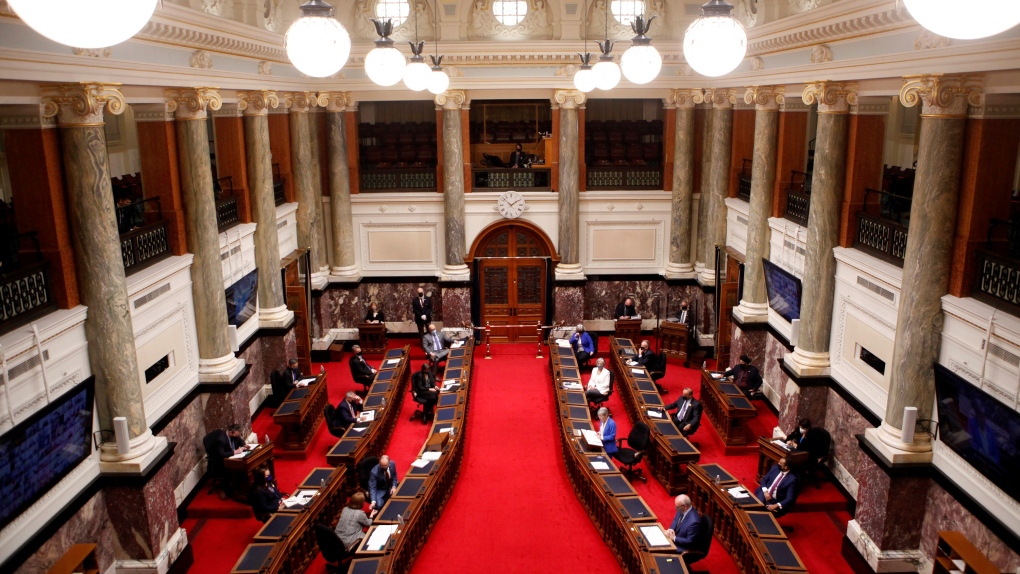Here's how many B.C. government workers got pandemic pay raises, and how much it cost taxpayers, according to a report
 B.C. Finance Minister Selina Robinson tables the budget in a speech in the legislative assembly at the provincial legislature in Victoria, Tuesday, April 20, 2021. THE CANADIAN PRESS/Chad Hipolito
B.C. Finance Minister Selina Robinson tables the budget in a speech in the legislative assembly at the provincial legislature in Victoria, Tuesday, April 20, 2021. THE CANADIAN PRESS/Chad Hipolito
A just-released report suggests taxpayers in British Columbia spent millions more during the pandemic on raises for government workers.
According to the Canadian Taxpayers Federation, 33,336 B.C. government workers got raises in 2020, at a cost of approximately $69 million.
In 2021, 28,972 got a pay boost, to the tune of about $47 million. In total, $116,095,813 went to paying workers more over the two-year period, the report from the fiscally-conservative non-profit says.
The data provided by the CTF suggests B.C. was among the provinces giving out the most raises in the last two years, following Ontario (64,958 employees) and Quebec (42,149).
Federally, nearly 313,000 government workers made more during the pandemic. Altogether, the data obtained by the CTF via Freedom of Information Act request suggested 528,347 government workers at the federal and provincial levels got raises.
In a news release Monday, B.C. director for the CTF Kris Sims pointed out many non-government workers took a pay cut, lost their job or saw their business severely impacted during the same time.
"It's unfair to ask them to pay higher taxes so bureaucrats and politicians can get a pay hike," Sims said.
The report from the not-for-profit agency that looks to reduce taxes by cutting government spending said Statistics Canada data shows that in addition to the pay raises, 306,800 more government jobs were added across Canada since the start of the pandemic.
It was not clear which sectors saw increases in headcount and salary, but the pandemic has likely created more work at the government level in areas including health care.
Prior to the pandemic, daily updates from the Health Ministry were not the norm, and several other events have occurred in that two-year span, including unprecedented heat, devastating floods and an escalating opioid crisis.
Still, it's easy to see why some would feel frustrated, especially small business owners who've been drastically impacted by public health restrictions associated with the pandemic.
Tax changes coming into effect in 2022 are likely unwelcome news for many who've struggled to make ends meet, including that those making $40,000 or more this year who will see more of their income deducted federally.
The B.C. government will be increasing its carbon tax later this year, meaning it'll cost more to drive and to heat residents' homes. Federally, the Canada Pension Plan and Employment Insurance tax each cost more, and alcohol taxes are set to go up in April.
In addition, many municipal governments are hiking property taxes, including in Vancouver where the city's new budget includes a higher-than-proposed 6.35 per cent increase.
CTVNews.ca Top Stories

American millionaire Jonathan Lehrer denied bail after being charged with killing Canadian couple
American millionaire Jonathan Lehrer, one of two men charged in the killings of a Canadian couple in Dominica, has been denied bail.
Judge says 'no evidence fully supports' murder case against Umar Zameer as jury starts deliberations
The judge presiding over the trial of a man accused of fatally running over a Toronto police officer is telling jurors the possible verdicts they may reach based on the evidence in the case.
Nearly half of China's major cities are sinking, researchers say
Nearly half of China's major cities are suffering 'moderate to severe' levels of subsidence, putting millions at risk of flooding especially as sea levels rise.
LeBlanc says he plans to run in next election, under Trudeau's leadership
Cabinet minister Dominic LeBlanc says he plans to run in the next election as a candidate under Prime Minister Justin Trudeau's leadership, amid questions about his rumoured interest in succeeding his longtime friend for the top job.
Sports columnist apologizes for 'oafish' comments directed at Caitlin Clark. The controversy isn't over
A male columnist has apologized for a cringeworthy moment during former University of Iowa superstar and college basketball's highest scorer Caitlin Clark's first news conference as an Indiana Fever player.
Health Canada to change sperm donor screening rules for men who have sex with men
Health Canada will change its longstanding policy restricting gay and bisexual men from donating to sperm banks in Canada, CTV News has learned. The federal health agency has adopted a revised directive removing the ban on gay, bisexual and other men who have sex with men, effective May 8.
Prince Harry formally confirms he is now a U.S. resident
Prince Harry, the son of King Charles III and fifth in line to the British throne, has formally confirmed he is now a U.S. resident.
U.S. vetoes a widely supported UN resolution backing full membership for Palestine
The United States has vetoed a widely backed UN resolution that would have paved the way for full United Nations membership for the state of Palestine.
'Shopaholic' author Sophie Kinsella reveals brain cancer diagnosis
Sophie Kinsella, the best-selling author behind the 'Shopaholic' book series, has revealed that she is receiving treatment for brain cancer.
































